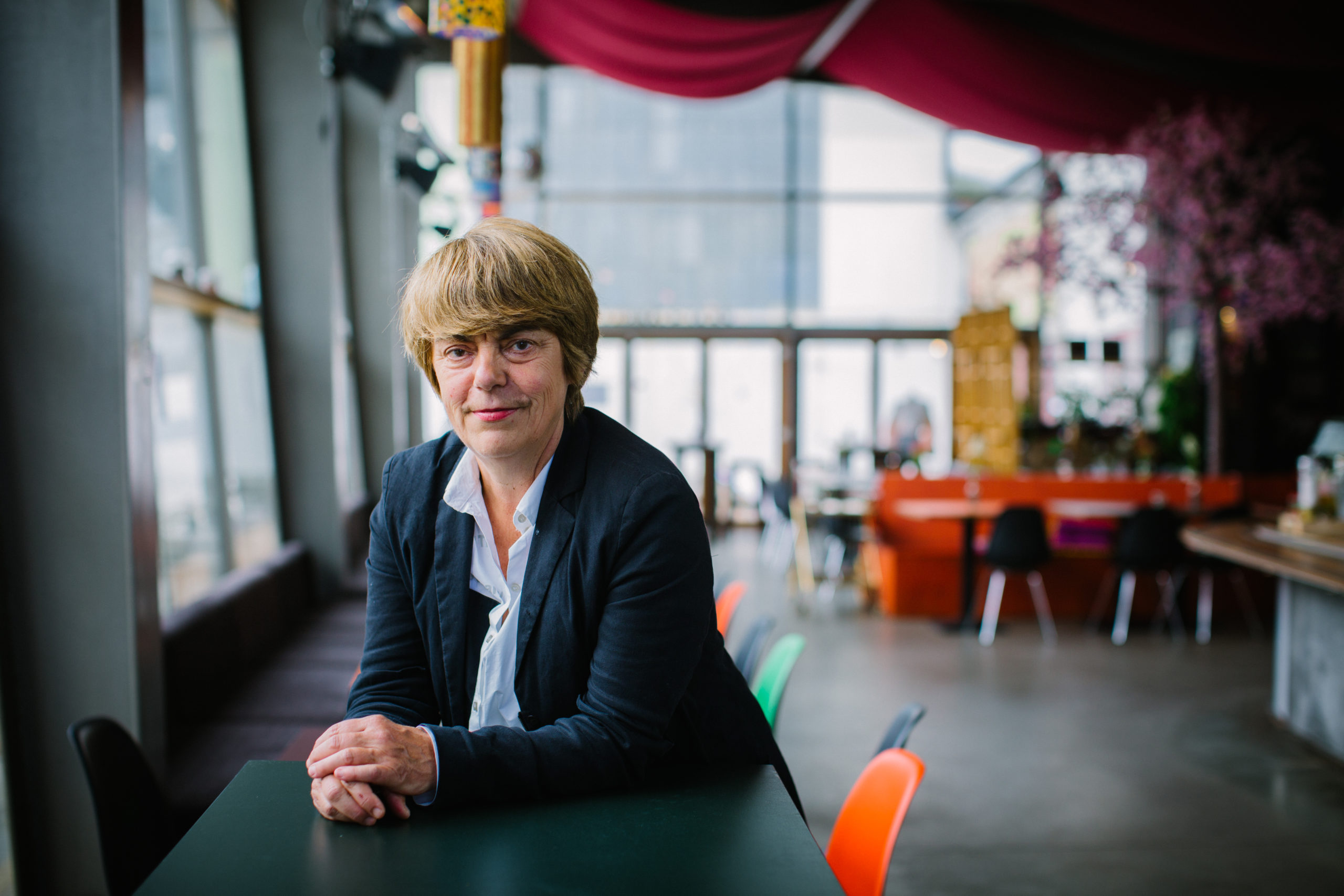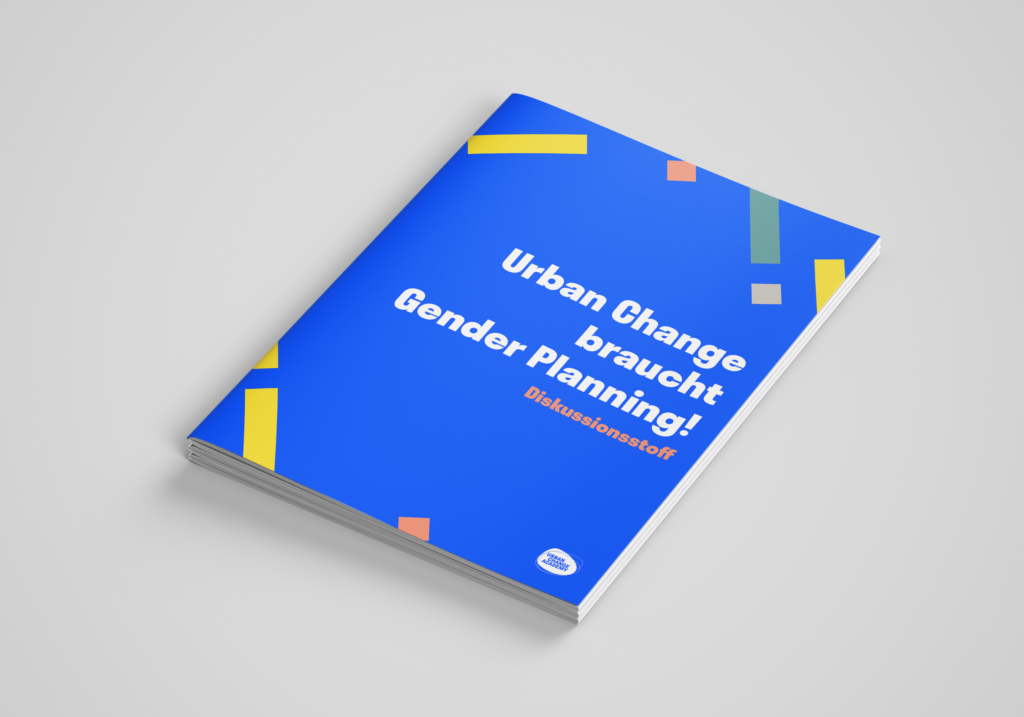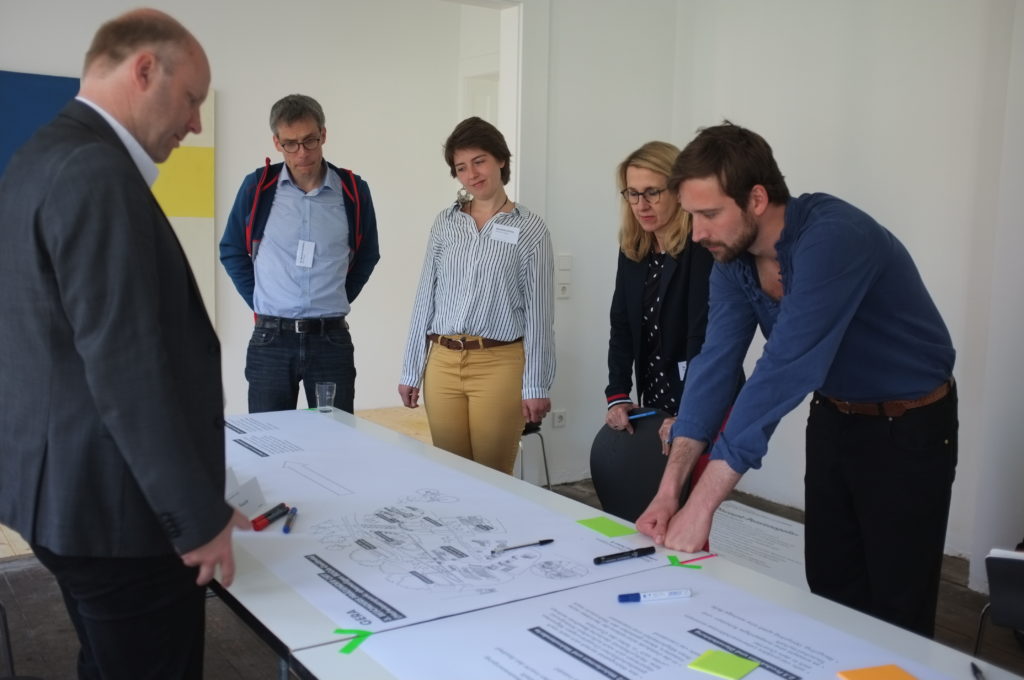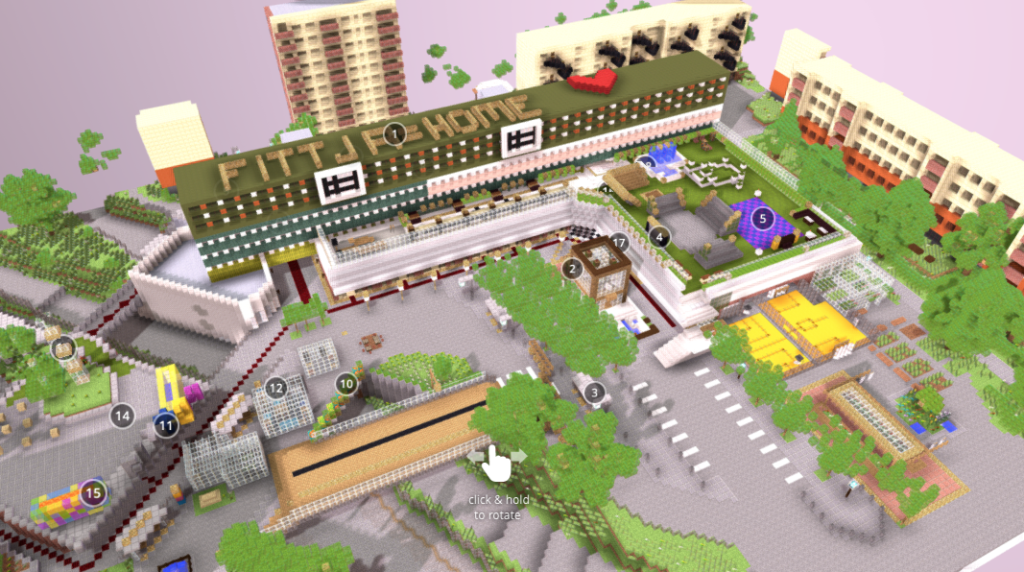Urban Change Academy: What has your experience of the Covid Pandemic been like so far?
Amelie Deuflhard: As is probably the case for most people, the effects of the Covid crisis have been felt differently at different times over this long period of time. I try not to let it get me down so easily and maybe that’s why I’m still in a reasonably good mood. That being said, I have found it difficult. The first lockdown was like a shock. I still remember, we theatre directors and the head of the Elbphilharmonie, we could not imagine that we had to close. Kampnagel is a medium-sized institution, I have 130 employees. Running a business in these times is a real challenge. Especially if you decide to continue with business-as-usual somehow. You can’t just carry on as before. All the work areas and processes that were well-rehearsed before the pandemic have since fallen away. In the office, we now work in a decentralised way with digital and hybrid meetings. For the artistic work, the central question is how we can continue to uphold our relevance, including our social relevance that we claim at Kampnagel, if we have no real spaces to perform in.
During this process, we are intensively dealing with the question of what the Covid pandemic means for all areas of life – locally as well as globally. It turns out that the effects for privileged people are not nearly as serious as for people who are less privileged. And this can be seen locally, nationally, and globally and regarding the distribution of income, the gap between rich and poor, the climate crisis, inequality in medical care or migration. All these social and global problems, which have been accepted consequences of global capitalism, have been further exacerbated by the global pandemic.
Globalisation and migration are topics that Kampnagel has dealt with intensively. You have worked a lot with migrants. To what extent is it possible for you to continue this kind of work?
We work both locally with a migrant diaspora and with a diaspora of people with refugee backgrounds. Globally, of course, we work with many artists from different countries and continents. International exchange is very complicated at the moment and intercontinental exchange is almost impossible. I believe that this will remain the case for the time being, at least until we open again in the early summer. This means we have to completely rethink our methods of production. The question of how we will work internationally in the future is complex. For the time being, I assume that we will continue to travel, but there will also be other forms of exchange.
For example, reproducing pieces locally again and again, this would mean that a piece created by an international director or choreographer could be created anew in different places with local artists. This is often possible with conceptual approaches; Jérôme Bel already practises this principle. But you also have to consider that there are many artists from other less-privileged continents whose livelihoods are dependent on their travelling from place to place and whose artistic activity is not possible without travel.
How are you dealing with this?
One example is the fact that we are bringing the Chilean choreographer Jose Vidal to Hamburg at the beginning of April. The idea is that he will create a piece here with thirty to fifty amateurs or semi-professional dancers from Hamburg who are keen on movement. It is about closeness and distance, about how our physicality has changed during these times of crisis. It’s a wonderful challenge for a choreographer, and Jose Vidal has always had a very intense and dense physicality in his choreographies. We’re just planning it now and we don’t yet know if, and how, we’ll be able to do the rehearsals!
So, he’s actually physically coming here to Hamburg?
Yes, he is physically coming here and maybe he’ll bring two or three people from his core team with him. We’ve told him clearly that we don’t even know when he will be able to rehearse here in real life and how small the group of people he will rehearse with has to be. It may be that we can only rehearse online from April to May. Theoretically, he could also do that in Santiago de Chile, but he also wants to carry out some research to get a picture of the local situation in Hamburg. At the moment, my strategy is to think of new productions in different scenarios. This means thinking about Vidal’s play as it would be done on one of our Kampnagel stages, but also imagining how it could be performed in the Stadtpark or in the Sankt Pauli Stadium or, in the worst case, how it could be played online. During rehearsals, the artistic teams have to think about all this because the location and the underlying conditions have consequences for the production. It’s a real challenge!
What other effects have the Covid restrictions had for you?
The hardest effect for me personally is that there is no public life any more. The fact that there is no art, no theatre, no events and no museums is serious, of course; but the most serious thing is that there are no more meetings and encounters at all, whether in the office, in the club, in the restaurant, in the bar or in the nightclub, and that will have consequences. There is hardly any public discourse any more, there are simply no opportunities to meet, only on Zoom, of course. But in my view, that isn’t as strong as being in a room with people.
Not having places like restaurants, bars, theatres, opera houses or the town hall where you can just go, festivals all over the world, where you meet people you know and people you don’t know. That just doesn’t exist anymore and that’s a huge problem because it also has an impact on the political debate.
What effects have you felt or seen?
Things are getting worse and more visible, for example in the way that public discourse is conducted. Because many people insist on sharing their point of view in a very ideological way, discussions are often not possible anymore. It’s also difficult to tolerate different opinions. You can befriends with someone, discuss your thoughts on a certain topic, and if you have different attitudes, you can fight it out. And afterwards, you can just sit down at the table again and drink a beer or have lunch together or enjoy a glass of wine. We are slowly running out of practice in this form of debate. We are not really governed by the government at the moment. Angela Merkel and the government ministers decide on the measures needed to combat the pandemic largely on their own. In the past, i.e. until last year, decisions were made democratically in parliament, but we are far from that at the moment. Because the pandemic has made it more important to act quickly. We will see what effects this has on our democracy.
Art and culture play a central role in social discourse – people watch a play together and perhaps have different opinions about it – that’s where it all starts. The lack of such impulses feels like a kind of vacuum to me. Where does reflection take place, if not in the cultural and artistic institutions as it did before?
Artistic institutions are places to gather. Actually, there aren’t that many places where we go to spend time with so many people. Maybe in a football stadium, that’s also a nice place to gather, especially in the St. Pauli stadium. Or the theatre, when you go to see a play, but also to meet other people. Most of the time, people go to the theatre in pairs, or even in groups of several people. But no matter where they go, they know pretty well that they will meet other people there, because these are places that are visited regularly by certain groups of people. At Kampnagel, I make a point of cultivating this kind of gathering beyond watching a play. Be it by organising a premiere party for the audience afterwards, or planning some kind of opportunity for them to sit together in the restaurant, or dance with us in the club. In this way, we extend the time of coming together beyond watching the artistic pieces.
I have always pushed the concept of gathering very strongly. And that’s exactly why we cultural institutions have almost logically been the first to close and are always the last to open. Because we represent the opposite to what society currently needs. Namely, to stay at home and only meet in pairs.
There is not much left.
Everything I normally use in our cities isn’t there anymore, except for my office and the streets and parks. It’s clear that cities have lost a large part of their function – except for local transport, living and working. All the other structures that make up urban life have been lost. Any reason for people to want to live in the city has been removed at the moment. If you only communicate via Zoom, you no longer need to be anywhere in particular.
Kampnagel is a kind of campus or meeting place. There is a restaurant, and in the summer there is a beautiful garden outside. The space is also used by the neighbourhood community. People come by, meet each other, the children can run around, or you can just come and have a coffee or watch something. So that means there is also another level to what we do. What happens here is not something you can do from India with a Zoom call.
That’s why I’m still on site and I think it’s important that I remain personally approachable even in times when we all work in a decentralised way. One of the most beautiful developments in terms of social life took place here on the Kampnagel site during the first lockdown, when the playgrounds were closed. There is a concrete ramp in our entrance area and it was suddenly transformed into a playground by children and young people. There were always skaters here and small children came with their parents. The forecourt became a playground and people simply reappropriated the public space. Responsibly, of course, in line with the Covid rules. I thought that was great, because it was a kind of transformation in social life as the theatre entrance area was turned into a playground. It was especially nice, for me of course, because playing is part of our profession at Kampnagel.
Let’s talk a bit more about the city, society and Covid. You also said that there is almost no public life right now. How does the role of citizens change in a post-Covid city?
That’s a very good question. Well, I am convinced that citizens will resume their social lives as soon as they’re allowed to again. I hope that those people who have raised and discussed the things that have now become visible will have a stronger role in public debate in the future. These could be academic or activist positions, but they will be heard more. That would be a very optimistic interpretation of the post-Covid era. Clearly that’s not the case right now. In any case, I believe that people who criticise our society and our world should try to gain more positions in public life. We need public debate!
What could that look like?
More focus on the social, less egoism. By that I mean not only thinking about personal success. Deceleration is also an interesting topic to think about. Capitalism is based on the motto higher, faster, further. But slowing down has interesting aspects if you think about it. Perhaps some people who were previously only interested in becoming faster, better and earning even more money are now questioning this. This brutal stop that we have all experienced and dealt with in our lives could also have some interesting aspects. We’ve had more time to think, not been so rushed, travelled less, had less mobility – that certainly has disadvantages, but it can also have advantages.
What phenomena do you expect to see in the future of cities as a result of Covid that we are not yet observing today?
One development that was already apparent before Covid is that cities today are actually designed as purely consumer areas that are very, very unattractive, especially if the opportunities for consumption are closed as they are now. There are many people who have been saying for a long time that we need to make our cities greener and car-free. Covid could be a positive accelerator to this end. By the way, cities also need to become more diverse in terms of their uses. The city centre doesn’t just have to consist of shops. There could also be places for start-ups or creative people, or designers with their workshops.
Then, it would be much more interesting to look around. Regarding Hamburg, could we do something different with the empty Karstadt and Kaufhof buildings? They could also be used in a super cool way.
How would you use the vacant Karstadt building?
It could, and should, be put to temporary cultural use. And when it comes to temporary cultural use concepts, I’m an expert. For example, I temporarily used the Palast der Republik in Berlin with a group of other stakeholders. A temporary use is always first and foremost an experiment. You see what works without fixing everything in advance – you work in a methodical way. The Karstadt building could be used for small shops owned by young gallery owners, start-ups, artists, coworking spaces, studios, and so on. In this way, it could be used for things that are actually needed. And the temporary usually quickly generates ideas for subsequent uses.
What skills are important for you personally for dealing with this crisis situation now? And, at another level, at the city or authority level, what skills are important there?
This may sound a bit stupid now, because we are talking about a very serious pandemic – but I always find times of crisis interesting. They are times when the old is partly swept away and the new can develop. I find this more invigorating than paralysing. I want to develop solutions and new concepts. What is being asked of us here in the pandemic is almost unbearable for many people, they are suddenly confronted with death, even young people. Others are excluded, for example children who have no help at home or problems with the language. On the one hand, there are privileged people who can cope well with such a crisis. But on the other hand, there are also many who cannot handle it at all. And with the continuation of this long road, which we probably still have to walk, it weighs more and more heavily. I am beginning to think that, somehow, we should have managed to deal with the Covid measures in a more differentiated way and to include other social aspects more. I find it super problematic that the social problems lurking behind them are possibly no longer being tackled. And I think new ideas have to be developed. But since we no longer have a broad public discourse – only a small club of bosses makes all the decisions – it is becoming more and more one-dimensional.
What should an Urban Change Academy teach?
I believe that it is important that there is comprehensive participation in society. By that I don’t mean that every single person should have a say, but that as many people as possible from as many areas as possible should be brought in – different generations, men, women, immigrants, refugees, homosexuals, heterosexuals, transgender people and so on. And different sectors of the economy sociologists, economists, pastors too if you like – it would be quite interesting to hear what they have to say about how cities can function in the future. An alliance of different thinkers from different disciplines and with different backgrounds would be interesting and could open new perspectives. Another concrete example comes to mind – the old people’s home of the future. We always think it’s only old Germans who are in old people’s homes. What about the old people who grew up in Anatolia, for example? They get food that is completely different from what they would have cooked for themselves. We have to think about our society in terms of diversity, because the city (today) and in the future is very diverse and this has to be taken into account, not only in different disciplines, but also – perhaps we will learn one day – in that we are an immigration country and people from many different backgrounds gather in the cities.
Thank you very much.
Photo: © Julia Steinigeweg




